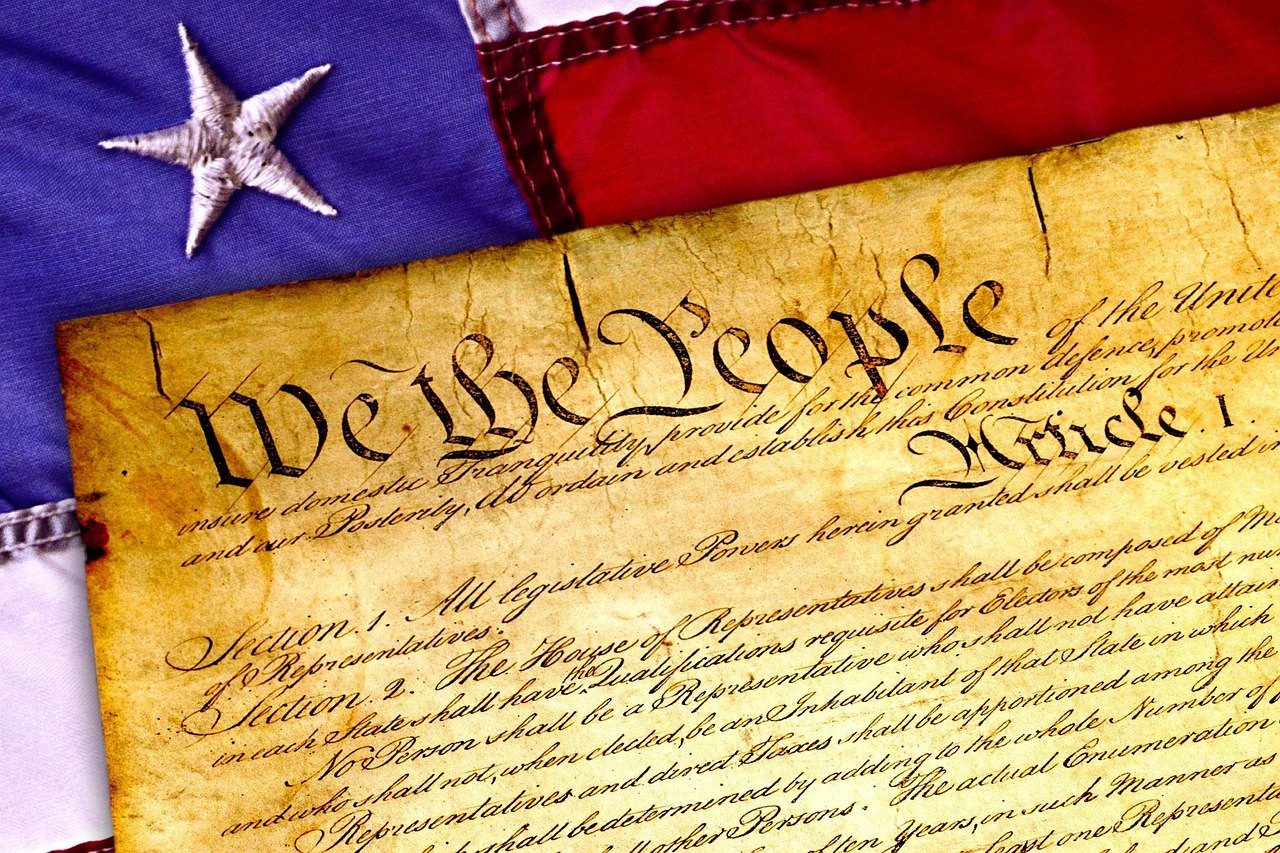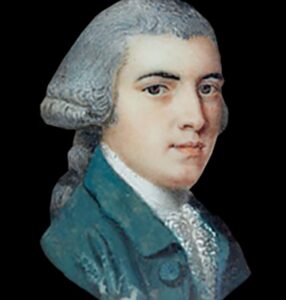
Benjamin Harrison V was a Virginia planter, merchant, and politician. His parents were from two of the most wealthy and powerful families in Virginia. He inherited several plantations, thousands of acres of land, numerous slaves, a fishery, and a grist mill. He was elected to the House of Burgesses. During the Second Continental Congress he voted for and signed the Declaration of Independence. He was the fifth governor of Virginia and later served in the Virginia House. He opposed ratification of the United States Constitution because it did not contain a bill of rights. Harrison died in 1791. One of his sons (William Henry Harrison) and a great-grandson (Benjamin Harrison) became United States Presidents.
Benjamin Harrison V was born on 5 April 1726 in Charles City County at Berkeley Plantation. (The family did not use the Roman Numerals to designate generations, but historians have inserted them to avoid confusion. I will use the numerals where needed.) Benjamin was the oldest of ten children born to Benjamin Harrison IV and Anne Carter.

The first Benjamin Harrison reached the colonies about 1630 and became a tobacco planter. By 1633 he was involved in local politics. Benjamins II and III were delegates to the Virginia House of Burgesses. Benjamin IV was Justice of the Peace and represented Charles City County in the House of Burgesses. By this time Benjamin IV had accumulated a large fortune, several plantations, and thousands of acres of land. He built the manor house, Berkeley, in 1726. This manor house overlooks the James River. It is still occupied today and is open to the public.
Benjamin V’s mother Anne was the daughter of Robert “King” Carter who was the most powerful and most wealthy man in Virginia. He was also very influential in American politics. The “King” owned more than 300,000 acres of land and a thousand slaves. The first Carter to settle in Virginia was John who arrived in 1625. He built the ancestral home, Corotoman, in Lancaster County, Virginia.
Benjamin V attended the College of William and Mary as did most males of the landed gentry. While at the college he became acquainted with fellow students Patrick Henry and Thomas Jefferson. Harrison’s studies were cut short when his father and two sisters were killed by a lightning strike on 12 July 1745.
Being the oldest male, 19-year-old Benjamin V inherited the bulk of his father’s estate. This included the 1,000-acre Berkeley plantation, several other plantations, thousands of acres of land extending to Surry County and the falls of the James River, a fishery, and a grist mill. He became responsible for the equipment, stock and slaves needed to operate these large holdings. His father did not leave all to his oldest son, so Benjamin V’s siblings inherited another six plantations, possessions, and slaves.
In 1748, Benjamin married Elizabeth Bassett from New Kent County. Elizabeth was the daughter of Colonel William Bassett and Elizbeth Churchill. Benjamin and Elizabeth were married for 40 years and had eight children that survived childhood.
In 1749 Harrison was elected to represent Surry County in the House of Burgesses. He served until 1761 and then represented Charles City County 1766-1781, Surry County again 1785-1786 and Charles City County again 1787-1790.
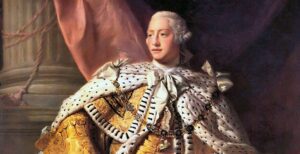
Early in his service in the House of Burgesses, Benjamin was appointed to the Committee of Propositions and Grievances which responded when the Royal Governor of Virginia (Robert Dinwiddie) levied a new tax on land patents. The committee drafted a complaint to the Governor and the King. However, the British Privy Council replied, “that the lower house is a subordinate lawmaking body, and where the King’s decisions are concerned, it counts for nothing.” Later, a compromise was reached with the governor.
In 1768 Harrison assisted in a response to the Townshend Acts, which had levied taxes on nearly everything the colonists used. Because of the intense colonial opposition, the acts were soon repealed except for the tax on tea. This resulted in the 16 December 1773 Boston Tea Party in Massachusetts and other scattered acts of resistance.
People in all the colonies were inspired by the Boston Tea Party, but some, including Benjamin, believed the East India Company should have been reimbursed for their losses.
Although relations with the Crown were getting the most attention, the Burgesses did conduct other business. In 1772 Harrison, Thomas Jefferson and four others prepared a petition to the King to end the slave trade from Africa. The King rejected the petition without comment.
Parliament in 1774 responded to the colonial resistance by enacting even more punitive measures that removed most of the few rights the colonists had. The Parliament called these acts the “Coercive Acts,” but in the colonies they were known as the “Intolerable Acts.”
The Virginia House of Burgesses condemned the Coercive Acts and called for a Continental Congress. On 5 August 1774, the First Virginia Convention selected Benjamin Harrison to be one of seven Virginia delegates to the Continental Congress which was to convene in Philadelphia.
Benjamin Harrison left Virginia for the first time and arrived in Philadelphia on 2 September 1774. He arrived with a good reputation and gravitated to the older more conservative delegates. He was distant with the New Englanders, and the more radical, particularly John and Samuel Adams. John Adams was not an admirer of the American South nor of most southerners. In private he often denigrated southerners.
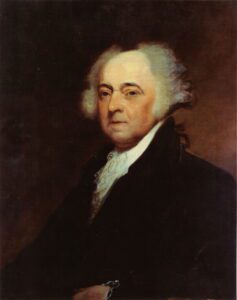
The genuine dislike between the Adams’ and Harrison was also because of the Adams’ Puritanism and dislike of human “pleasures” and Harrison’s love of those pleasures. John Adams described Harrison in his diary as “another Sir John Falstaff,” as “obscene,” “profane,” and “impious.” To be fair, John Adams did not like fellow Bostonian John Hancock for the same reasons. John Adams did admit that Harrison had said he was so eager to serve in the Congress that “he would have come on foot.”
In October Benjamin signed the Continental Association, an agreement to boycott all British goods. This was modeled after the earlier Virginia Association. The First Continental Congress concluded that month with a Petition to the King that requested that the King “attend the colonies’ grievances and restore harmony.” All the delegates signed the doomed document.
When Harrison returned home, he received a letter from Thomas Jefferson advising him his order for 14 sash windows had arrived from London just prior to the boycott. Jefferson apologized that he had been unable to cancel the order.
In March 1775, Harrison attended a convention in Richmond made famous by Patrick Henry’s “Give me liberty or give me death!” speech. Also, a resolution to raise a military force passed 65 to 60, which was quite a step for Virginia. Although Harrison probably was in the minority, he was named to a committee to carry out the resolution. He was also elected to the Second Continental Congress.
It was May 1775 when the Second Continental Congress convened, and Harrison resided in north Philadelphia with his brother-in-law Peyton Randolph and George Washington. Harrison soon was residing alone because Randolph died, and Washington became commander of the Continental Army. Harrison kept busy with the problems of funding and supplying Washington’s army and often corresponded with him.
In the spring Congress made another attempt at reconciliation with the King with the” Olive Branch Petition” authored by John Dickinson of Pennsylvania. Harrison was adamantly opposed to the petition, but it passed and was submitted. The King refused to even read the petition and formally declared the colonists to be traitors.
In November, Harrison, General Washington, Benjamin Franklin, and Thomas Lynch traveled to Cambridge, Massachusetts to assess the needs of the army. After ten days, they concluded that military pay should be raised, and the ranks increased to 20,000 men.
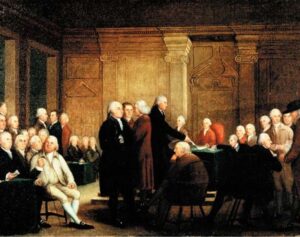
Benjamin served frequently as chairman of the Committee of the Whole and presided over the final debates of the Lee Resolution for independence. The Committee of Five presented Thomas Jefferson’s draft of the Declaration on 28 June 1776. On 1 July the Committee of the Whole resolved to debate the draft and on Thursday 4 July 1776 the Declaration of Independence was adopted. The Declaration was then sent to be embossed before signing by those present for the vote.
Harrison was known for his bold sense of humor. Even John Adams had to admit in his diary that “Harrison’s contributions and many pleasantries steadied rough sessions.” Pennsylvania delegate Benjamin Rush recounted an example of this sense of humor that occurred during a 2 August 1766 signing of the Declaration of Independence. He described the session as a scene of “pensive and awful silence” because the delegates believed they were probably signing their death warrants.
Rush said Harrison interrupted “the silence and gloom of the morning” as delegates filed forward to sign. Rotund and tall Harrison approached the slight Elbridge Gerry who was about to sign and said, “I shall have a great advantage over you, Mr. Gerry, when we are all hung for what we are now doing. From the size and weight of my body I shall die in a few minutes and be with the Angels, but from the lightness of your body you will dance in the air an hour or two before you are dead.”
Despite the danger, all delegates proudly and without hesitation signed the Declaration. Afterwards they returned to other business of the Congress.
As the war intensified, the American Army was conducting on-the-job-training while fighting the superbly trained and experienced British Army. On two occasions between December 1775 and March 1777, the British Army forced Congress to retreat from Philadelphia-first to Baltimore, Maryland and later to York, Pennsylvania.
During 1777, Harrison became a member of the Committee of Secret Correspondence for the Congress. The main job of the committee was to communicate with American agents in Britain. He was also named Chairman of the Board of War which was to review the army’s moves in the north and the exchange of prisoners. There were fewer prisoner exchanges as the war progressed because the British had no desire to send soldiers back to the American ranks.
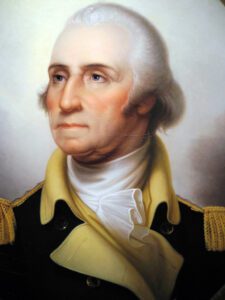
Benjamin became at odds with his friend, General Washington over Marquis de Lafayette’s commission. Harrison insisted it was honorary without pay. Lafayette did serve bravely, and without pay.
During debate over the Articles of Confederation, Harrison argued unsuccessfully that Virginia should have more representatives than other states based on population and land area.
Harrison’s congressional service ended in October 1777, and he returned to Virginia. Several of his estates had been ravaged and much of his fortune had been lost. However, he was elected to the Virginia House of Delegates which had replaced the House of Burgesses. Benjamin was elected Speaker of the House in late 1777 defeating Thomas Jefferson by a vote of 51 to 23. He was re-elected to that position several times.
In January 1781, the traitor Benedict Arnold commanding a force of 1,600 British and Loyalist soldiers landed at the mouth of the James River. His ultimate target was Richmond, the new capital of Virginia. Harrison quickly evacuated his family from Berkeley and rushed to Philadelphia to seek military support. He obtained supplies and troops, but on a delayed basis, which was no help.
Arnold advanced up the James destroying everything on both sides of the river. When he raided Berkeley, he burned all family portraits so that no likenesses of that family would survive. Most of the other Harrison possessions were destroyed as was a major portion of the manor house. (It took many years for Harrison to repair the damage and to rebuild.) Arnold continued to Richmond and finally withdrew ending his campaign on 19 January 1781. He had destroyed Richmond, and many military facilities and plantations.
The war continued and was costing the states much of their wealth, and more importantly, their young men. The last major battle of the Revolutionary War was the American/French victory at Yorktown, Virginia when Lord Lieutenant General Cornwallis was forced to surrender himself and his army to General George Washington on 19 October 1781.
Benjamin Harrison was elected the fifth Governor of Virginia in December 1781 and served three terms. There had been a rapid succession of governors during the unstable war years. The main problem facing the state was money. The war had drained the treasury. Benjamin was able to stabilize the problem, but he could not solve it. He also opposed any new military action against the Indians in the west.
General George Rogers Clark had urged aggressive action against the western tribes, but Harrison prevented it. Instead, he made treaties with the Cherokee, Chickasaw and Creek tribes which resulted in at least a temporary peace. Harrison and Clark had some very contentious exchanges about Indian policy.
At the end of Harrison’s last term as governor, General George Washington accepted an invitation to visit him. Washington wrote “And I shall feel an additional pleasure, in offering this tribute of friendship and respect to you, by having the company of Marsqs. de la Fayette.” Washington made the visit in November 1784, but Lafayette was unable to attend.
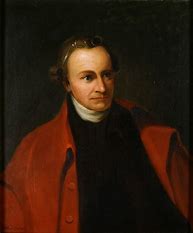
Harrison wanted to retire after his service as governor but was re-elected to the Virginia Legislature. He was also re-elected to the Speaker’s position. In 1786 the Virginia Legislature was divided over the place of religion in the state. Benjamin and his brother Carter Henry Harrison supported a measure proposed by Patrick Henry to fund teachers of the Christian religion. This proposal failed and the legislature enacted Thomas Jefferson’s Virginia Statute for Religious Freedom, which established separation of church and state.
In 1788 Harrison was a member of the Ratifying Convention for the United States Constitution. Harrison, Patrick Henry, George Mason, and others opposed ratification because of the strength and size of the central government and the absence of a bill of rights. The Constitution was ratified by a small margin on 25 June 1788. Benjamin stated that he and other dissenters should work to amend the Constitution. (The Bill of Rights was ratified on 15 December 1791.)
Although George Washington had actively supported ratification of the Constitution, he praised Harrison, writing: “Your individual endeavors to prevent inflammatory measures from being adopted redound greatly to your credit.”
Harrison continued in the House of Delegates despite being in poor health and having financial difficulties. In 1790, he was nominated for governor, but declined because he supported the incumbent.
Harrison was again elected governor in 1791, and the day after his election he invited a party of friends to dine with him. He had been suffering a great deal from “gout in the stomach” but had nearly recovered. That night he experienced a relapse, and the next day, 24 April 1791, death ended his suffering. The exact cause of death is unknown, but in addition to chronic gout he had been significantly overweight most of his life.

Benjamin Harrison was buried at Berkeley Plantation. His wife, Elizabeth died the following year and is buried next to him.
A residential hall at William and Mary College is named for Harrison V as is a bridge that crosses the James River near Hopewell, Virginia.
In addition to the Harrison families’ service already noted, others should be mentioned. Benjamin V’s siblings:
Brother Carter Henry was a leader in Cumberland County, brother Nathaniel served in the House of Burgesses and the Virginia Senate, brother Henry fought in the French and Indian War, and brother Charles was a brigadier general in the Continental Army. All the girls married into other powerful families.
Harrison V’s descendants continued the family tradition of service to the country with two being elected President of the United States. His son Benjamin Harrison VI served in the Virginia House of Delegates. Another son, General William Henry Harrison was a congressional delegate for the Northwest Territory, was Governor of Indiana Territory, and served in the War of 1812. He was elected President of the United States in 1840 but died just one month into his presidency.
William Henry was the father of Ohio Congressman John Scott Harrison who was the father of Benjamin Harrison, a brigadier general in the Union Army during the American Civil War and who served in the U.S. Senate. He was elected President of the United States in 1888 defeating incumbent Grover Cleveland.
Benjamin Harrison V is just one member of a large family that has contributed much to the United States from early colonial times to the present-a span of nearly 400 years. This nation is fortunate to have such families. It is always “We the people” that make up this great Republic.
